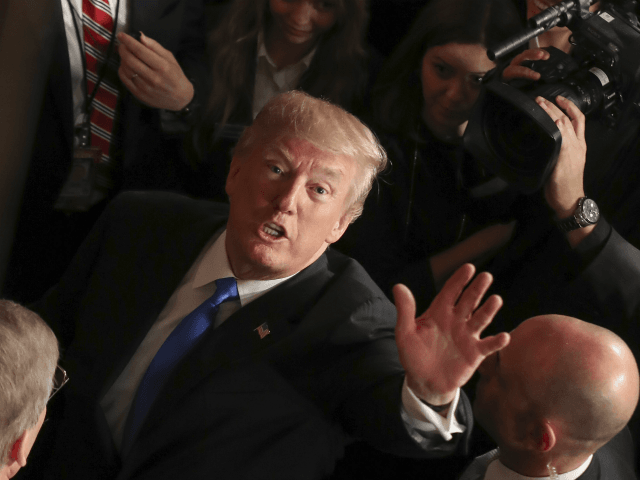WASHINGTON, DC – President Donald Trump touted his commitment to several key constitutional issues in his State of the Union Address on Tuesday, including judicial appointments, religious liberty, the Second Amendment, and whether terrorists are entitled to constitutional protections.
Article II, Section 3 of the Constitution requires that the president share his thoughts on the current state of the Union, though it can either be delivered personally or sent as a written document. Discharging his constitutional duty in a primetime nationwide address that has received high marks, President Trump raised at least five constitutional issues, each of which is important to his political base.
“Working with the Senate, we are appointing judges who will interpret the Constitution as written,” the president began, reaffirming his belief that judges should be originalists when interpreting the Constitution, and textualists when interpreting lesser federal laws such as statutes and regulations.
He singled out as an example of this approach his nomination and successful confirmation of “a great new Supreme Court justice,” referring to Justice Neil Gorsuch. During his short tenure so far on the bench, Gorsuch has proven himself a strictly principled jurist who had not deviated even once from the original public meaning of any provision in the Constitution or federal law.
President Trump also noted that he and the Senate had appointed “more circuit court judges than any new administration in the history of our country,” a reference to installing 12 federal appeals judges during the first year of the Trump presidency. Hours before the president’s speech, the Senate confirmed a 13th appellate pick, Judge David Stras, to the U.S. Court of Appeals for the Eighth Circuit.
“We are defending our Second Amendment, and have taken historic actions to protect religious liberty,” President Trump continued, highlighting two issues where controversies are often ultimately settled by the federal judges he referenced. These two issues in particular—the First Amendment and Second Amendment—were under regular attack in the previous administration.
President Trump took significant action to counter those attacks. The president signed Executive Order 13798 on May 4, 2017, the first-ever executive order to protect religious liberty in America. Also in 2017, he became the first sitting president since President Ronald Reagan to speak to the annual meeting of the National Rifle Association of America.
“I call on the Congress to empower every Cabinet Secretary with the authority to reward good workers,” President Trump continued, “and to remove federal employees who undermine the public trust or fail the American people.”
That too is a significant constitutional issue. Article II of the Constitution provides that all “executive Power shall be vested in a President of the United States of America,” establishing the constitutional principle that every person serving in the executive branch of the federal government serves as a delegate of the president and should be answerable to the him as the duly elected chief executive. The Supreme Court strayed from this constitutional principle of democratic accountability in its 1935 Humphrey’s Executor case, restricting the power of the president to fire political appointees who previously served only at his pleasure.
Congress has also blurred that constitutional line by establishing civil service protections to keep lower-level federal workers from being fired even if they work at odds with the president’s agenda. While it is very unlikely that the current membership of the Supreme Court would strike down those civil-service provisions as unconstitutional, President Trump is calling upon Congress to address this issue by changing the relevant federal statute, and restore democratic accountability to the largest branch of government.
“I just signed an order directing Secretary Mattis to reexamine our military detention policy and to keep open the detention facilities at Guantanamo Bay,” the president said later in the State of the Union, adding that this military facility on foreign soil is the appropriate place to hold those terrorists because they are “unlawful enemy combatants” instead of “criminals.”
That is a term with constitutional significance. In 2008, the Supreme Court handed down a landmark decision in Boumediene v. Bush, where a narrow 5-4 majority held that America’s century-long lease of “Gitmo” from Cuba effectively makes that land American soil. The Court held that therefore the writ of habeas corpus applies to detainees in Gitmo, allowing prisoners there to contest their confinement in federal court as if they were criminals.
Conservatives regard the liberal Boumediene decision as one of the worst national-security decisions ever issued by the Supreme Court, and hold out hope that a more conservative Court will overrule that decision. Calling the detainees unlawful combatants instead of criminals indicates that this president is not willing to cede that issue.
Unlawful enemy combatants are also not entitled to legal protections as prisoners of war under the Geneva Conventions. Here too, the president may be signaling a willingness to push to restore what conservatives regard as the correct legal standard. If Gitmo detainees are neither criminals nor prisoners of war, they can be dealt with on an expedited basis, and never released back to the battlefield if the U.S. military determines they would be on ongoing threat.
In a State of the Union focusing on a wide array of issues, President Trump made it clear that constitutional principles would remain a major focus of his Make America Great Again agenda in 2018.
Ken Klukowski is senior legal editor for Breitbart News. Follow him on Twitter @kenklukowski.

COMMENTS
Please let us know if you're having issues with commenting.